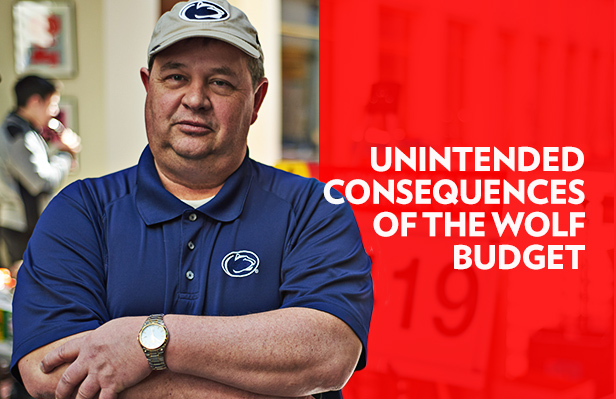Commentary

The Unintended Consequences of Wolf’s Budget
Note: This commentary was published in the Allentown Morning Call, Erie Times-News, and York Sunday News, among other news outlets.
Kermit Bell is worried about his 90-year-old mother, Louise. Like many seniors, Louise Bell sold her house when she moved to a Palmyra nursing home and lives on a fixed income. But if the proposed sales tax expansion contained in Gov. Tom Wolf’s budget proposal becomes law, her nursing home costs will jump by $3,000—essentially adding a 13th month to her annual bill.
That’s just one of the many unintended consequences of Wolf’s budget plan which—despite being sold as tax cut for middle-class families—would create few winners and many losers across every income level. Folks like Louise Bell stand to lose big.
Kermit Bell says, “My mom—and I suspect most of the others in her home—simply cannot afford this unprecedented tax on senior citizens in the twilight years of their lives.” Worse, because Louise Bell no longer owns a home, she will receive zero benefit from Wolf’s proposed property tax shift. In fact, for first year of Wolf’s plan, no one will.
The governor’s budget calls for tax increases to begin this year, but funds for property tax rebates wouldn’t arrive until October 2016—more than a year later.
With a 2-year-old and a baby on the way, my own family will be hit hard by the budget proposal. In addition to a higher personal income tax, we’ll pay more than $1,000 in new daycare taxes plus about $50 more each year for taxes on diapers. Even if Wolf actually delivers on his property tax relief, we’d see less than $500 off our property tax bill.
For most families, tax hikes will dwarf any cuts. Wolf promises $3.7 billion in property tax rebates in 2016, but would collect $12 billion more in state taxes. That means only 30 cents of every dollar in new taxes sent to Harrisburg would return for property tax relief.
Overall, the governor’s tax plan amounts to a net increase of $1,400 per family of four every year.
Worse, Wolf’s tax rebate scheme itself is unfair: Based on income and sales taxes alone, more than 80 percent of school districts are losers in this tax shift, according to a House Republican analysis.
School districts across the state would receive between $301 and $5,209 in rebates per homeowner. Our analysis shows that districts already receiving more education funding from the state—meaning they are less reliant on local property taxes—stand to gain the largest rebates per homeowner.
For a governor who emphasizes fairness, this rebate scheme displays surprising inequality. For example, in the governor’s home county, the York City School District would get $5,209 in rebates per homeowner—the most in the state—while West Shore School District would only see $467.
Here’s the reality: Pennsylvania schools aren’t suffering from underfunding. We spend more on education now than ever before—thousands more per student than the national average. Money isn’t the problem. The problem is how we spend it.
Raising taxes on Louise Bell won’t help our schools, but undoing ridiculous state mandates can.
For starters, legislators should end prevailing wage rules which require school districts to pay more for construction projects than they need to—that’s like picking out a $299 iPhone and offering $350 for it instead. It’s a pointless waste of taxpayer dollars.
According to Census data, school districts spent more than $1.6 billion on construction in 2012. Eliminating prevailing wage mandates for schools—a measure introduced recently in HB 707 by Rep. Jesse Topper (R—Bedford) and supported by the Pennsylvania School Boards Association—would save taxpayers hundreds of millions of dollars each year.
End prevailing wage at the state level and taxpayers could save a stunning $1 to $3 billion every year. Isn’t that a better solution than raising taxes on growing families and on seniors like Louise Bell?
Fixing Pennsylvania’s broken school funding formula would also help education dollars get to where they are most needed, alleviating the need for property tax increases.
Gov. Wolf was right when he said, “It’s not good enough to just say no and continue with the same old same old.” Lawmakers can and should address rising property taxes and ensure schools are properly funded—but without taking more from working families.
# # #
Elizabeth Stelle is director of policy analysis for the Commonwealth Foundation (CommonwealthFoundation.org), Pennsylvania’s free market think tank.